President Trump on Sunday shook hands with North Korean leader Kim Jong Un as they met at the demilitarized zone that has divided the Korean peninsula for 66 years, signaling a willingness to restart nuclear talks in a remarkable, impromptu meeting that appeared to come together in less than 48 hours.
The moment President Trump meets Chairman Kim at the DMZ and becomes the first sitting President to enter North Korea: pic.twitter.com/VwqGAEmmxz
— The White House (@WhiteHouse) June 30, 2019
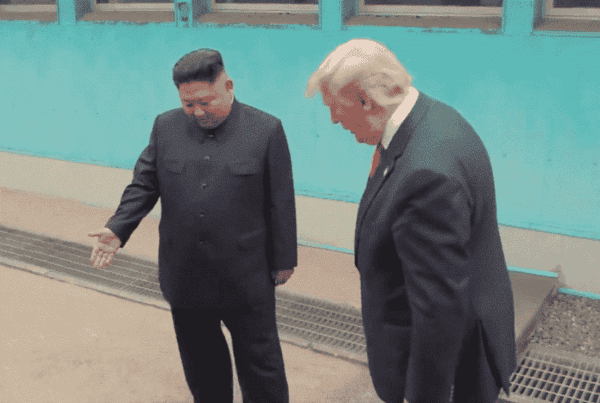
President Donald Trump met North Korean leader Kim Jong Un and became the first sitting U.S. President to step into North Korea. (The White House/Released)
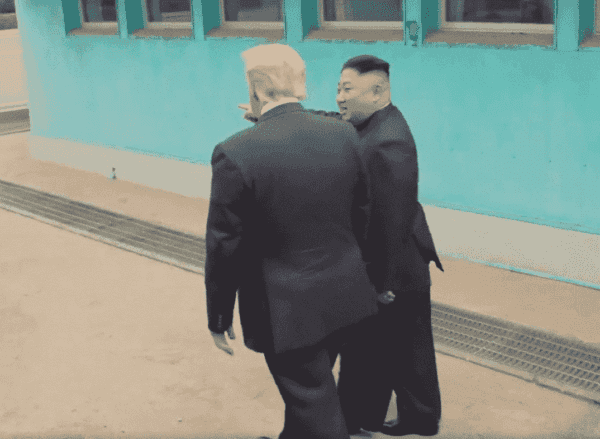
President Donald Trump met North Korean leader Kim Jong Un and became the first sitting U.S. President to step into North Korea. (The White House/Released)
Their 53-minute get-together did not include substantive negotiations, but the imagery alone was historic: An American president met Kim on his own literal turf.
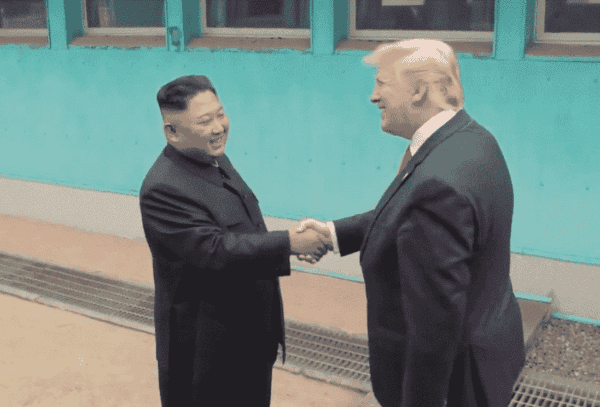
President Donald Trump met North Korean leader Kim Jong Un and became the first sitting U.S. President to step into North Korea. (The White House/Released)
Kim, who greeted Trump in English and made him aware that he’s the first sitting U.S. president to visit his country, called it “a historic moment” and “a very courageous and determined act.”
HISTORIC🤝🇺🇸🇰🇵 pic.twitter.com/eY0qNOK5XC
— Dan Scavino Jr.🇺🇸 (@Scavino45) June 30, 2019
Trump, after taking 18 steps into North Korea before stopping and turning back, said that “stepping across that line was a great honor.” About their hastily arranged meeting, he said: “That was very quick notice and I want to thank you.”
After their handshake and words of praise for one another before the press, Trump and Kim did sit down for a private meeting inside the House of Freedom on the South Korean side.
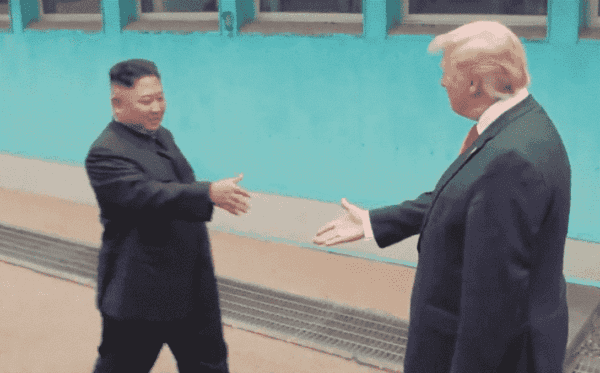
President Donald Trump met North Korean leader Kim Jong Un and became the first sitting U.S. President to step into North Korea. (The White House/Released)
With the meeting at the 38th parallel, Trump again showed his love of theatrical gestures and historic firsts. He also displayed his continued willingness to set aside human rights concerns surrounding Kim’s government, which is among the world’s most oppressive.
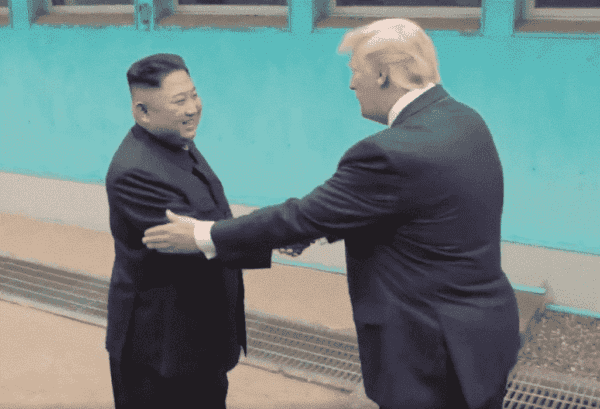
President Donald Trump met North Korean leader Kim Jong Un and became the first sitting U.S. President to step into North Korea. (The White House/Released)
Despite a lack of tangible progress toward reversing North Korea’s pursuit of nuclear weapons, Trump has continued to pursue personality-driven diplomacy on his own terms in hopes of a historic agreement.
Although he walked away from his second summit with Kim last February in Hanoi after negotiations hit a snag, Trump has continued to insist on his good relationship with the young North Korean ruler and expressed optimism about eventually reaching an agreement to at least curtail the country’s nuclear ambitions.
He had relentlessly hyped the possibility of the meeting at the DMZ in the 24 hours leading up to it, repeatedly stating that North Korea “wants to meet” as he continually updated the press on how arrangements, which came together quickly, were progressing.
Following a short helicopter ride from Seoul, Trump went first to an observation point and looked into North Korea, as four other presidents have done.
Cognizant of the television camera trailing him, he spoke to the troops manning the observation point, which is heavily armed, about how his diplomacy has reduced the threat from North Koreas.
“I say that for the press. They have no appreciation for what is being done, none,” he insisted. “There was great conflict here prior to our meeting in Singapore,” he added.
“After our first summit, all of the danger went away.”
Moments before meeting with Kim, Trump also thanked U.S. and South Korean troops stationed on the border and scrawled his familiar signature on the brick wall inside the U.S. post along the DMZ.
South Korean President Moon Jae-in praised the president for engaging North Korea, saying at a news conference before the meeting that, “President Trump is the maker of peace on the Korean peninsula.”
“Sixty-six years after the armistice, North Korea and the U.S. will meet,” Moon said at the news conference. “For the first time, U.S. and North Korean leaders will stand face to face at Panmunjom, a symbol of the division, and shake hands for peace.”
Trump described the planning for the meeting in the most casual of terms.
“I was just thinking yesterday, ‘Hey, I’m here, let’s see if we can say hello to Kim Jong Un,’” Trump said at the news conference. “There’s a lot of good feeling.”
Taking a victory lap for his engagement with North Korea, Trump falsely claimed that Kim had refused to meet with his predecessor, President Obama.
“The Obama administration was begging for a meeting,” Trump said. “They were begging for a meeting constantly, and Kim Jong Un would not meet with him.”
In reality, Kim and his father, who preceded him as North Korea’s ruler, had both sought a face-to-face meeting with U.S. presidents. All past presidents, including Obama, had refused to meet unless North Korea made changes in its policies, especially its pursuit of nuclear weapons.
Trump has been willing to meet with Kim even as the North Koreans continue to develop their nuclear arsenal and test missiles, although they have stopped tests of long-range missiles that potentially could reach U.S. territory.
He has portrayed the diplomacy with North Korea as the result of his unique personality-focused approach to foreign policy and a friendship he’s established with Kim.
“For some reason, we have a certain chemistry,” Trump said.
Despite that claim, there’s a gaping difference between the U.S. and North Korea on what a nuclear deal would look like.
In Hanoi, Kim offered to shutter North Korea’s primary nuclear complex but declined to discuss the rest of its nuclear and missile arsenal. In return, he asked for large-scale relief from economic sanctions.
U.S. officials have said North Korea must put its entire nuclear program on the table and that sanctions will only be removed after denuclearization.
Since Hanoi, there have been no talks to work out the disagreements and explore a middle ground.
In its state propaganda, North Korea has increasingly returned to bellicose rhetoric, blaming the U.S. for the breakdown in talks. It has refrained from criticizing Trump, however, instead directing barbs at other officials, including Secretary of State Michael R. Pompeo.
Asked at the news conference what Kim has done to deserve a third face-to-face meeting, Trump did not answer, but said Sunday’s meeting could pave the way for another full summit meeting between the two.
“It’s just a step. It might be an important step and it might not,” he said. “As far as another meeting, let’s see what happens today before we start thinking about that.”
Despite his willingness to engage with autocratic leaders without conditions, Trump insisted that he’s not overeager for a final deal.
“I’m in no rush,” he said. “I’m in no rush with Iran. I’m never in a rush. If you’re in a rush, you get yourself in trouble.”
The first public indication the two leaders might meet came when the president tweeted Saturday that he hoped to see Kim when he visited the DMZ — a part of his itinerary that had been widely speculated about but kept under wraps by the White House for security purposes until Trump confirmed it publicly.
Hours later, he told reporters at a news conference in Osaka, Japan, that North Korea had responded quickly to express Kim’s openness to the somewhat impromptu meeting.
“He follows my Twitter,” Trump said of Kim.
“We have a very good relationship, the two of us,” Trump said earlier in the day, repeating an assertion he made a day earlier that he believes the U.S. and North Korea would be at war had he not been elected.
“I’m really the opposite of a warmonger,” Trump said.
Moon endorsed the meeting with Kim at the outset of his own meeting with Trump here on Sunday afternoon.
A handshake across the border that has separated North and South Korea since the 1953 armistice that ended the Korean War would be an immensely powerful image, he said.
“I believe that picture in itself would represent a historic event, and this will be a significant milestone in the peace process on the Korean peninsula,” Moon said at the outset of a meeting with Trump.
Moon spoke to Trump over dinner Saturday about what he described as Kim’s resolve to denuclearize and spoke positively of the North Korean leader, Moon’s spokesman told local reporters.
Trump also spoke amicably of Kim, the spokesman said.
Moon and Kim held a summit in April of last year in the DMZ at the village of Panmunjom, where the armistice was signed. The two initially shook hands standing on either side of a concrete barrier, then Moon invited Kim to step over the border into South Korea, and Moon stepped into North Korea, holding Kim’s hand.
Trump said Saturday that he would be willing to step into North Korea himself, should he be invited.
“It will be very short, but that’s OK,” he added. “A handshake means a lot.”
———
© 2019 the Los Angeles Times
Distributed by Tribune Content Agency, LLC.



